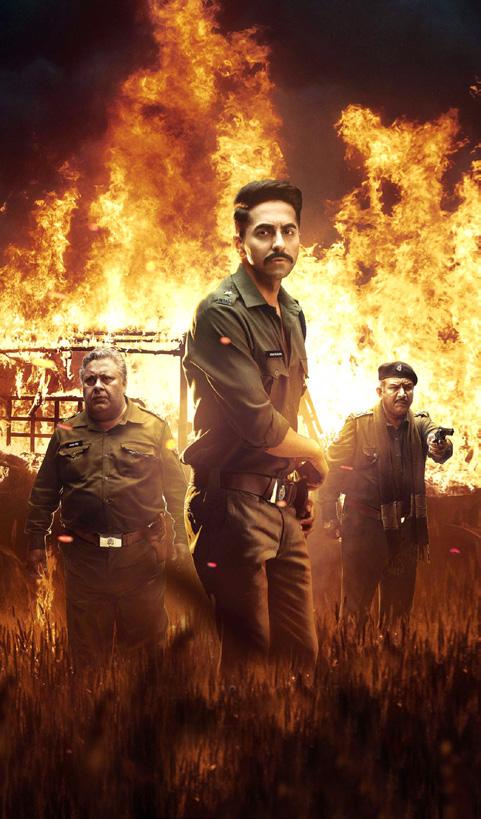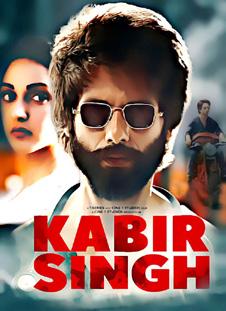
4 minute read
QUESTIONING, DISTURBING
from 2019-07 Sydney (1)
by Indian Link
Article 15
STARRING: Ayushmann Khurrana, Manoj Pahwa, Kumud Mishra
DIRECTOR: Anubhav Sinha
HHHH
Article 15 is thought provoking, questioning, disturbing and ultimately cathartic, because the cop-hero (played with a simmering intensity by Ayushmann Khurrana) succeeds in getting justice for the wronged.
In real life it is different, though. And in giving the underdogs of the film a satisfying closure, director Anubhav Sinha (who has clearly turned a new leaf after Mulk) and his co-writer (Gaurav Solanki) remind us that happy endings are for the movies, and that we are getting one here because, hey, no matter how authentic, Article 15 is a film after all.
Sinha's stunning film says a lot of things we don't really want to hear about social discrimination in the cow-belt areas. The movie takes us to a dusty little town in UP where a sophisticated liberal cop (Khurrana) joins duty and immediately stumbles onto a horrific caste crime whereby two girls are gang raped and hung by a tree. A third girl is gone missing.
Sinha imparts to the search for the girl a 'thriller' element that in no way overdramatizes the film's incessantly grim mood. There are no songs even in the background because there is nothing to sing about. Not here.
In telling this hideously messy tale, Sinha makes no effort to spare the details. The caste system and gender discrimination are so deeply embedded in the social fabric of rural India that men, or at least a section of them, feel entitled to teach women a lesson if they don't comply.
In my favourite sequence of this
Kabir Singh

STARRING: Shahid Kapoor, Kiara Advani, Suresh Oberoi
DIRECTOR: Sandeep Reddy Vanga
HHHH
Remakes, more often than not, disappoint. This one doesn't. Kabir Singh doesn't quite better its precursor, the game-changing Telugu film Arjun Reddy. And really, Shahid Kapoor is no patch on Vijay Deverakonda, who sweated, bled and urinated (literally) into his despicably misogynistic character, investing into this weird, reprehensible child-man a kind of contemporary resonance that makes for a bizarre blend of Devdas, James Dean and all the rebels without a pause that we have encountered before and after Amitabh Bachchan's Angry Young Man.
Shahid Kapoor's Kabir Singh is a troubled man, threatening, swearing, drinking and fornicating his way through life.
It is strange that this thankless, self-absorbed, foul-mouthed and illtempered Kabir is loved and protected by a cordon of family, colleagues and best friend Shiva (Soham
Majumdar) who seem to see some sort of goodness behind the uncouth behaviour which the audience can't.
It's not easy to like Kabir. The character is so flawed and fractured, so fuelled and felled by its own inbuilt anger that every move he makes seems one more step towards selfannihilation.
The writer-director gives his anti-hero the full slow burn treatment. There is no effort to show Kabir in a kind light.
A senior intern in a medical college, he succeeds in bullying the timid, tremulous medical student Preeti into believing he has fallen so passionately in love with her, she must reciprocate in kind. What follows is an embarrassing array of stalking scenes and a stream of smooches and lovemaking, all indicating a very high level of subverted intensity in a man whose morals equal that of an alley cat.
The brilliance of this film about rebellion, love and self-destruction, resides in the rawness of the scenes and the hurtful nature of words that characters use against one another. In the second half, when Preeti has rightly dumped Kabir, he asks a female friend
Rebel Without A Pause
exceptionally relevant drama the criminal tells the cop Ayan Ranjanin a casual almost blasé tone, why the women they raped and killed so brutally had to be a taught a lesson. I heard the same unrepentant tone in the Netflix series Delhi Crime when one of the rapists tells the cop the girl had to be put in her place.
The sequence is chilling for the way the masculine mind works in a maledominated society.
I would have liked to see Khurrana's rage more overtly expressed in this scene. It is the sign of a civilised bureaucrat's struggle with his self to cling to his core of humanism and civility while all around him the world crumbles and collapses into a heap of brutality and incivility.
The film has an exceptionally astute sense of pitch and tone. Though the background score is flashy, Anubhav Sinha never over-punctuates his drama. He is not afraid to let the world he recreates glisten with the sweat of inhuman conduct. The actors are all so clued into the director's kingdom of the damned that they blissfully slip into their roles with no apprehension of tripping over the abyss of self-conscious authenticity.
Besides Khurrana who brings a feeling of bridled indignation to every scene, the film's other hero is Ewan Mulligan's cinematography. It doesn't miss a single detail in the ravage and chaos of the heartland, so unpolished and yet so untouched (don’t miss the butterflies in the moth jar.)
Article 15 is a film that must be seen by every Indian. Not because it tells us something new. But because what it tells us ought to become irrelevant to our society now.
Subhash K Jha
Shahid plays this toxic intoxicated man with a furious flair for seething emotions. But the performance lacks the freshness of what Vijay Deverakonda brought to the character in the original. The venomous emotions, though expressed with a disturbing sincerity, never quite reach Shahid's eyes.
Here is an actor in full control of his character's uncontrollable emotions, not quite able to process those emotions to their fullest. A flawed, but nonetheless remarkable performance. That the character obtains his redemption at the end is only because the screenplay wants to be kind to him. This man deserves no second chance. Making the redemptive moment unbearably undeserved is Kiara Advani, whose emotional outburst at Shahid's reformative whining flies everywhere as though making a last-bid effort to match her co-star's ongoing hysteria.
if she would like to satisfy his "physical needs" with no strings attached. This obnoxious offer is made in the tone of a demi-God bestowing a favour to a subject.
Though at times the film is as flawed as its protagonist, it is nonetheless an important film in divulging what the young urban Indian male thinks of the plans life makes for him.
Subhash K. Jha








